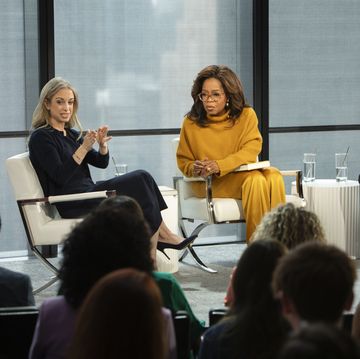If you're in the midst of birthday party planning for one of your kids, you've probably mulled over the concept of a "fiver" party. That's where, instead of getting a gift from each attendee, you request that each person contribute $5 that the birthday child can then use to purchase a bigger, more special gift. Parents of the attendees like them because they don't have to spend a lot of time or money selecting a gift to buy, and parents of the birthday child like them because it cuts down on the amount of clutter — and possibly unused or unwanted toys — that enter the house. But what about the birthday kid? Some research shows that fiver parties (or, if you're Canadian, a "two toonie" party, after the Canadian two-dollar coin) are actually beneficial for children.
Fiver parties cut down on the number of toys a kid gets, which increases the quality of play.
Lots and lots of toys don't just clutter up the playroom — they also unfocus your kids' minds. "Particularly with younger children, the fewer toys they have the more they benefit developmentally," says Susan Newman, Ph.D. social psychologist and author of Little Things Long Remembered: Making Your Children Feel Special Every Day. "In a study of toddler play, for example, the children were given either four or 16 toys. The children with four toys played more imaginatively, in more varied ways and for longer periods of time — all of which is developmentally beneficial."
It gets them started learning about money.
It might be your natural instinct to shield kids from the idea of money, but an early start is actually better. "A study published in the Journal of Family Issues found that college students who remembered handling money as kids expressed confidence about their financial skills as young adults," says Katie Hurley, LCSW, author of The Happy Kid Handbook. "While a giant pile of gifts might feel like a lot of fun in the moment, a fiver party actually gives kids the opportunity to think about how to manage money. When kids have the chance to save up for a coveted item, they take pride in their purchase and feel confident about their ability to meet their own financial needs."
You can think about donating some of the money to a good cause.
That's not just a good deed, it's developmentally beneficial as well. "Research shows that when people give to charities, it activates the regions of the brain associated with pleasure, social connection, and trust," Hurley says. You'll also get a chance to talk with your child about your values, and the causes you feel passionate about as a family. "This would be instructive in teaching children to be empathic and charitable," Dr. Newman says. "You might also have all the children at the party vote on what cause a portion of the gift should go."
But you have to get the invitation wording to a fiver party right.
Even though it seems like a win-win — parents spend less on gifts, and get less junk — there's still a taboo around requesting cash. There's also something a that could be presumptuous about assuming you're going to get a gift (even though that presumption is totally founded). The important thing is to make sure the wording of the invitation notes that the gift-giver obviously has a choice. Something like:
"Your presence is the only present that we need, but should you want to give something to the birthday girl, please consider giving $5 that she can put toward something special."
If you know what your child is saving for, adding that to the invite might make it a little more satisfying for a would-be gift-giver. There are some that might bristle at the request for cash, but there are others (namely me) who feel this is even better than no-gift parties, because some parents bring gifts to no-gift parties anyway, making the others feel bad for following the rules. "It removes the competitiveness entirely and equalizes gift-giving field," Dr. Newman says.
And prepare your kid ahead of time.
While it seems like there's nothing but benefits for your kid, well, there might be some disappointment if your child is used to opening a big pile of birthday presents. "While school-age children are beginning to understand the concept of money as currency, preschool children might not have the same reaction to opening a card with $5 enclosed," Hurley notes. She says that, for the littlest ones, asking for books instead of bills might be the better option.
Then again, there could be a teaching moment in there, too. "Initially, a child might be disappointed that there's not an assortment of gifts to open," Newman says. "The flip side, of course, is that it’s an opportunity to learn to deal with disappointment." Which might be a hard lesson to learn on a birthday, but if you plan your fiver party with your child ahead of time, and talk up the excitement of saving for a bigger gift, they might not have to deal with the birthday blues.













